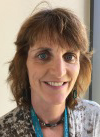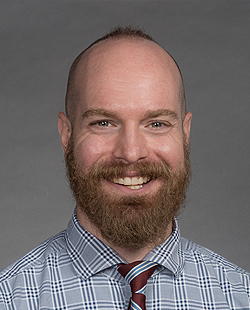Dr. Russell’s professional interests include ADHD, integrated/collaborative care, prevention and complementary/integrative approaches to child and adolescent mental health. He takes a holistic approach to psychiatric well-being that extends beyond medications and psychotherapy to include other evidence-based practices shown to improve brain health including regular exercise, time in nature, supportive social interactions, mind-body activities, good nutrition and sleep hygiene.

Personal Statement
I am a child and adolescent psychiatrist with experience in delivering guideline-based care for child and adolescent psychiatric disorders. I am the Medical Director of the Outpatient Psychiatry Clinics at Seattle Children’s, and have experience with training of staff to deliver guideline-based care. I also have health services training, including having obtained a Master of Public Health (MPH) in Health Services and participation in a Primary Care-Psychiatry Research Fellowship funded by the National Institutes of Health.
My clinical work includes treatment of outpatients and inpatients with a variety of mental health needs, and I provide telepsychiatry in our outpatient clinics. I have experience with collaboration with primary care providers to deliver care to pediatric patients, including serving as a consulting psychiatrist on the Partnership Access Line, which provides psychiatric consultation regarding mental health assessment and treatment to pediatricians and other primary care physicians throughout the state of Washington. I have expertise in the treatment of common mental health problems in a pediatric population.
My research has focused on mental health care for common psychiatric illnesses including depression and ADHD, and has included utilization of collaborative models of care and testing of interventions for youth with psychiatric diagnoses. I have been a co-investigator, with R01 PI Kathleen Myers, MD, for a study of guideline-based care provided by telepsychiatry for youth in rural communities with a diagnosis of Attention Deficit Hyperactivity Disorder.
Personal Statement
I am a Child and Adolescent Psychiatrist who has served for over 20 years as the attending psychiatrist on the middle-schooler unit at Child Study and Treatment Center. I also serve, 25% time , as “College Mentor” in the UW School of Medicine Introduction to Clinical Medicine Curriculum where I mentor six students in each UW SoM class through their four year curriculum. I serve as preceptor/supervisor for one CAP fellow during their rotation at CSTC. I also run the elective clerkship for fourth year medical students (approximately 10 students/year) during 2 and 4 week rotations at CSTC.
Personal Statement
I completed my Residency in Psychiatry with the UW in 1982 and since then have worked at Harborview Medical Center in the Psychiatry Department. I am a Clinical Associate Professor and provide weekend and on-call coverage for 5MB on the Intensive Psychiatric Unit.

Personal Statement
I am clinical psychologist and a Professor of Psychiatry and Pediatrics, and a clinical researcher specializing in ADHD throughout the lifespan. I direct the PEARL Clinic (Program to enhance attention, regulation, and learning) at Seattle Children’s. The PEARL Clinic is based on a multidisciplinary and collaborative care model which works closely with PCP’s who refer families to PEARL for evaluation and access to our behavioral group treatment programs and treatment recommendations. The PEARL clinic also provided multidisciplinary training for psychologists, psychiatrists, pediatricians, family medicine physicians, and medical students. The majority of my clinical work involves diagnostic evaluations and consultations for the parents, referring physician, and schools.
My research emphasis is on personalizing ADHD treatment, and determining how best to combine and sequence interventions throughout the lifespan for individuals with ADHD. I have assisted in the development of several stimulant and non stimulant medications, and participated in many clinical trials. Currently, we are conducting a study for parents with ADHD who have young children with ADHD symptoms where we are treating the parent with medication and behavioral parent training or behavior parent training. I am also investigating the relationship between genetic factors and ADHD treatment response.
Other areas of interest include sleep problems and overlap with ADHD, and novel treatments such as Trigeminal Nerve Stimulation (TNS) and augmentation strategies such as mindfulness and physical exercise or activity level.

Personal Statement
I am a basic neuroscientist, a board-certified practicing psychiatrist, and an Assistant Professor of Psychiatry and Behavioral Sciences at the University of Washington Medical School. The goal of my research is to investigate the neural circuitry of cognitive, emotional and memory processing, particularly as it relates to the cerebellum, and illnesses affecting cerebellum including cognitive disorders, PTSD, TBI and dementia through the implementation of techniques in mouse behavioral genetics. In my clinical practice, I primarily see veterans with PTSD, mild cognitive impairment, and various forms of dementia in an outpatient clinic at the VAMC Puget Sound Geriatric Research, Education, and Clinical Center (GRECC) in Seattle. I have over 15 years of experience in basic science research with most of that time dedicated to the use of mouse models of neuropsychiatric disorders.
Throughout my training prior to and during graduate school, I gained background in many contemporary molecular and biochemical lab techniques, such as molecular cloning, protein biochemistry, protein crystal production, fluorometric measurement of protein kinetics, in vivo NMR spectroscopy, gene targeting, microarray genomics, immunohistochemistry, and mammalian cell culture. I have a foundation in mouse genetics, neural development, and behavior which I developed in Michael Georgieff’s lab by investigating the role of iron in developing pyramidal neurons of the mouse hippocampus. During graduate training, I also received cross-training in child psychological development. In graduate school, I developed two mouse models of nonanemic neuron specific iron deficiency: 1) a conditional knockout of the Slc11a2 gene, encoding the iron transporter DMT-1 in forebrain neurons, including hippocampal pyramidal neurons, and 2) a transgenic mouse with a reversibly inducible dominant negative (nonfunctional) form of the transferrin receptor expressed only in hippocampal pyramidal neurons. I utilized and implemented different versions of the Morris Water Maze to study learning deficits in these mouse models of perinatal brain iron deficiency, a condition that is often a consequence of diabetes during pregnancy.
During my residency training, I expanded my knowledge of neuropsychiatric disorders by directly evaluating and treating patients with neuropsychiatric disorders including PTSD, schizophrenia, Alzheimer’s disease, autism, major depression, substance abuse disorders, and personality disorders. I learned numerous pharmacological, neuromodulatory, and psychotherapeutic interventions and participated in the internally funded Neuroscience Research Track. I then received a NIMH career development award (K08) mentored by Larry Zweifel, Ph.D. In that position, I investigated interactions between catecholamines and the cerebellum in decision making, emotional and cognitive processing. In the 5 years I was in Dr. Zweifel’s lab, I learned many additional new techniques including use of viral vectors, in vivo electrophysiology, and several operant- and threat-based behaviors, and moved forward in my goal of becoming a physician scientist isolating important circuits underlying etiology of specific domains of behavioral function. This work culminated in my receiving an RO1 independent investigator award, without any gap in funding.
My current research utilizes mouse behavior, in vivo electrophysiological recordings, gene targeting, viral vectors, translational profiling, chemo- and optogenetic tools, site-specific intracranial viral vector injection, and protein chemistry. I am now forging my path as an independent investigator, and my primary goal is to understand cerebellar circuits as they relate to psychiatric and neurodegenerative illnesses and utilize this knowledge to inform and improve current and novel psychiatric illnesses, primarily in cognitive and emotional domains. As such, I am pursuing a multidisciplinary approach combining genetic, electrophysiological, pharmacological, and behavioral techniques.
Personal Statement
My primary interests are Nutrition and Lifestyle Psychiatry, Cultural Psychiatry and the interface of Religion and Spirituality with Psychiatry. I love guiding patients to achieve healing using a domains of health approach- addressing Nutrition, Sleep, Relaxation, Movement and Connectedness/ Purpose.

Personal Statement
My work focuses on the diagnosis and treatment of ADHD in adolescents and adults. As part of this work I conduct clinical trials evaluating school, community, and parent based treatments for teens with in attention, motivation, and executive function challenges. I also am an investigator on several longitudinal studies of ADHD, including the Multimodal Treatment of ADHD (MTA) study. I have authored or co-authored over 120 scientific papers on ADHD and wrote a book about how parents and professionals can empower teenagers with ADHD.
I also specialize in the application of Motivational Interviewing approaches to the treatment of ADHD and am a member of the Motivational Interviewing Network of Trainers (MINT). This for includes training clinicians in strategies to adapt psychotherapeutic and pharmacological treatment for patients with ADHD, to improve treatment engagement.
My research has been funded by the National Institute of Mental Health, Institute of Education Sciences, American Psychological Foundation, and Klingenstein Third Generation Foundation, I am actively involved in Children and Adults with Attention Deficit Hyperactivity Disorder (CHADD), serving on its professional advisory board, spokesperson team, and editorial advisory board for Attention Magazine. I currently serve as the Secretary of the American Professional Society of ADHD and Related Disorders, and am a member of the APSARD Adult ADHD Guidelines Task-Force.
For full information about my work, please see my
professional website.







